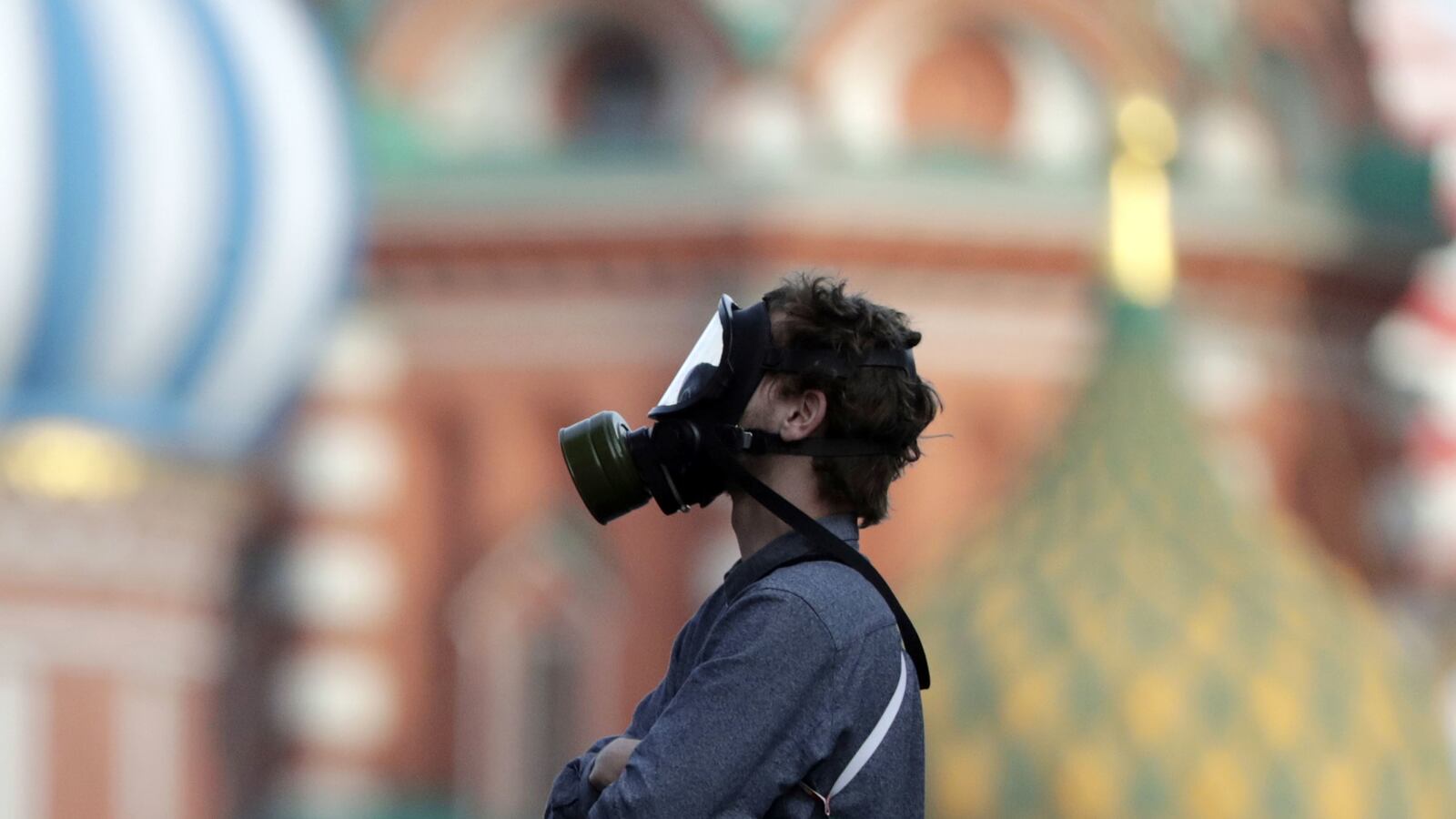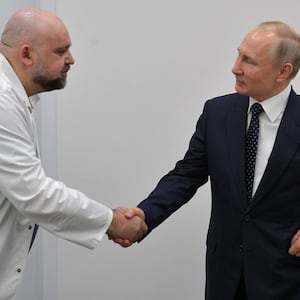MOSCOW—It is still an open question whether Russia’s machinery of repression, which dates back to the time of the Czars and became an all-pervasive presence under the Soviets, can be quickly re-tooled to enforce quarantines and slow the outbreak of COVID-19. Its purpose has always been to track down common criminals while silencing political opposition, and already we see it returning to that role as if by reflex.
The number of registered COVID-19 cases has passed 10,000; doctors diagnosed 1,459 more people on Thursday. The total number of infections is 10,131 and more than 40 people have died in Moscow alone, according to official numbers, which some analysts think are much too low. In any case, the numbers are expected to grow exponentially in Russia just as they have done elsewhere, and the disease already has reached every corner of the country.
As the statistics worsen, news of new restrictions and punishments have begun to rain down, and authorities have started issuing QR-code passes to state companies, media groups, and volunteers—primarily those loyal to the Kremlin.
Amid confusion, such measures provoke growing public concern about the coming of a new digital gulag that will stay in place long after the pandemic subsides. “QR codes are becoming a politicized privilege, which eventually will be corrupt,” says Olga Bychkova, the deputy chief editor of radio Echo of Moscow.
A week ago police detained a group of doctors from a professional union called the Doctors’ Alliance who were on their way to deliver personal protection equipment to hospitals in the town of Akulovka, in the Novgorod region.
“Police detained us for our charity activity but officially, they accused us of violating the self-isolation regime, although the Novgorod government had previously allowed people to leave home for work purposes," one of detained activists, Ivan Konovalov, told The Daily Beast. "Helping our colleagues was our job.
Svetlana Gannushkina, the head of a group called the Civic Assistance recalls the days when “Soviet militia could come into your home any time, if somebody told on you.” She remembers, “I once had to pay a big fine, one third of my salary, for letting my student stay in the apartment, and police kept coming at 6:00 a.m. to look for my student under the bed.”
This no longer feels like the distant totalitarian past portrayed by Nobel prize-winning novelist Alexander Solzhenitsyn or in the headlines of the 1970s and 1980s that surrounded the detention and surveillance of the nuclear physicist Andrei Sakharov and his wife, human rights activist Yelena Bonner. The repression, then, was all-consuming and led by the secret police of the Soviet KGB, where Vladimir Putin and many of his closest associates were serving officers.
For anyone familiar with that history, scenes on the streets of Moscow these days are menacing in ways that the somewhat more theoretical infringements on civil rights in the West are not.
In this city of more than 11 million people, under the new quarantine rules nobody should walk farther than 100 meters away from home, and policemen catch and fine people for violating the rules by using 170,000 facial-recognition cameras on the streets. Moscow Police Chief Oleg Baranov told journalists at a recent briefing that the capital needed even more cameras, “so that there is no dark corner of a side street left.”
Still, many people continue to use public transport, walk far from home, and go to their places of work, giving the government reason to tighten restrictions even more.
In addition to the QR passes there are also new smartphone programs to spy on public movement. Thanks to massive negative reaction in independent media, Muscovites have managed to push back against some of the new rules, so for now only known COVID-19 patients are to be monitored by those surveillance programs, but that could change at any moment.
In the public mind, the concerns about repression and doubts about the government’s depiction of the crisis combine with fear of the disease itself. Vyacheslav Moskvichev, a family psychotherapist, told The Daily Beast, “Now, when everybody is staring trouble in the face, it’s time for the Kremlin ultimately to be honest and sincere; our clients express doubts that authorities tell them the complete truth about the epidemic and there is an increasing fear of state surveillance.”
“People think that once registered as COVID-19 positive, all their personal data will be in the state’s hands forever,” said Moskvichev. “Many clients say they would not report their symptoms for as long as they can and try to recover at home.”
Echo of Moscow’s Bychkova is not surprised by that reaction. “There cannot be full trust,” she said, “because total control and punishments have been the only way that power has been used lately for interacting with society. So people are aware of this approach, and fear that their arms can be twisted behind their backs.”
As elsewhere in the world, many regions lack reliable tests for COVID-19. But Russian doctors have never had it easy, and the strain on them may be even higher than in the hospitals of other countries overwhelmed by the disease.
Under the 1993 constitution, Russians have a right to free health care, and those registered with district clinics don’t need to pay for medical treatment, in theory at least. But the level of corruption as well as the degree of professionalism varies by region, and in fact most Russians pay under the table for better care.
The average salary of a doctor in Russia is less than $800 a month, usually a fixed payment without overtime hours, but the real professionals—and despite the corruption, there are many—have persevered in good faith trying to treat people despite poor conditions. Now this system relying on doctors to do good without doing well is facing its most devastating health crisis since World War II.
The country had months to prepare the population and hospitals for the devastating epidemics that had hit China (a neighbor), Iran, Italy, and Spain. But so far, the underfunded system has failed to meet the main rule of any epidemic: protect your doctors. State hospitals, even the best ones, are closing down in Moscow and around the regions, including one of the major medical centers in Nizhny Novgorod, hospital No. 40. The reason: doctors need to be quarantined, too, if they don’t have any other protection.
Earlier this month the hospital treated a 40-year-old man with pneumonia in the intensive care unit, without taking precautions. The patient was intubated, a process that involves a great deal of contamination in the air as a tube is connected from the lungs to a respirator. Doctors treating the man wore no protective gear. Last week, after the patient’s test for coronavirus showed positive, the administration closed the entire hospital for quarantine.
The deputy governor for social policy, David Melik-Guseinov, told journalists that the virus had been discovered at two other city hospitals, and the potentially infected doctors ordered into isolation. Even Denis Protsenko, the chief doctor of Moscow’s designated COVID hospital, who had earlier received a much-publicized visit and handshake from President Vladimir Putin, tested positive last week.
Putin, who for decades has taken center stage in national emergencies, this time has delegated the responsibility for fighting the coronavirus outbreak to the prime minister and regional governors. Four governors already have been pushed out in Kamchatka, Nenets, Komi and Arkhangelsk.
Russia also is trying to figure out what to do with over 28,000 citizens stuck abroad. Most—at least 20,000 of them—are in Thailand. Authorities decided to pause the repatriation of tourists but provide money to those who are stranded.
“There is a sense of mess and disorganization,” says Vladimir Solovyev, a veteran political observer at the newspaper Kommersant. “Vice-Prime Minister Tatiana Golikova told us it was dangerous to bring thousands of people back, that it threatens another wave of the epidemic, while the Ministry of Foreign Affairs had everything agreed and organized to bring people back.”
Strained resources are felt in other ways. Patients with serious health problems other than COVID-19 have been unable to receive help as hospitals closed. About 200 patients receiving chemotherapy at Moscow’s rehabilitation center on Ivankovskoye Highway were told to wait until the end of the quarantine. The hospital closed on Monday.
“Our doctors working in all fields read medical studies on coronavirus treatment published in the UK or United States, the epidemic is uniting all medical specialists,” says Prof. Anna Belova, one of the leading neurologists of Nizhny Novgorod. “This is just like a war—no time to complain, criticize or protest. When Nazis attacked, nobody questioned the state system; so if doctors don’t have masks, they should make their own masks.”
Some doctors choose to revolt against the lack of help from the state. A group at Pokrovskaya hospital in Saint Petersburg addressed the press and authorities in a video. They said the hospital responsible for receiving coronavirus patients had no oxygen, little medicine and no protection for doctors. Instead of closing down in quarantine after a cardiac patient tested positive, the hospital chose to receive and help patients suffering from COVID-19. In the video, doctors wear plastic shower caps, their faces are covered with ordinary thin masks. “What you see on us is not protection from a virus,” one of the doctors said.
Maksim, a 37-year-old doctor in an emergency care unit in the Rostov region told The Daily Beast in a phone interview, “At the end of every working day, we exchange our screams for help in our professional group chats. That does not mean we are going to stop working, it only means that most of us will get infected and for some time we won’t be able to help others.”
The doctors stopped by police from delivering supplies in Novgorod region hoped to bring attention to this situation, but found the state apparatus turned against them, and the detentions were only the beginning.
The group’s leader, Anastasia Vasilyeva, is an ophthalmologist. She treats Russia’s key opposition leader, Alexei Navalny. The group decided to help the hospitals in Okulovka, after a senior physician there complained about the lack of protection—doctors had to use the same face mask for two to three days. But police put Vasilyeva and her team in detention for more than 12 hours.
“We managed to pass protective gear, 600 face masks, to two hospitals in the Novgorod region,” said Konovalov, “but now all state television channels condemn us for publicizing ourselves in the face of trouble, and the head doctors at the hospitals we helped forbid their employees, poor doctors, from using our charity protection.”






